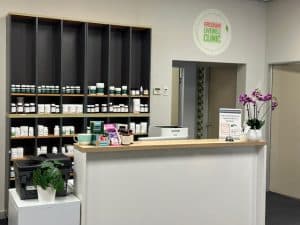Last Updated on 11 October 2024 by Brisbane Livewell Clinic
From an Acupuncturist’s perspective, Acne can occur when thick, oily skin is combined with a diet of damp producing foods (think dairy, oily/sugary foods) which increases sebaceous secretions and decreases the skin’s ability to eliminate toxins (1).
The Spleen oversees moving fluids in the body so if Spleen energy (QI) is low, body fluids slow down, thicken and stagnate. This stagnation is called Damp in Chinese Medicine, which can affect the Lung’s capacity to open and close the pores, trapping the dampness under the skin to create pustules seen in Acne vulgaris (1).
During your Acupuncture consult, we look at the health of the Lungs, which control the skin’s eliminating function, and the Spleen to reduce Damp in the body. We also look at the colour of the skin as redness can be a sign of heat or inflammation, which combined with thicker body fluids (or Damp) can indicate we need to clear Damp-Heat from the body. If left, the Heat can become toxic and accumulates under the skin with Damp to create pustules/lesions (1,2).
Many Acne sufferers also struggle with constipation (another elimination process) – which means toxins are not being cleared from the body effectively. This is called Qi Stagnation in Chinese Medicine which we address by using points to move the Qi to regulate the bowels and boost your metabolism and immune system. When we are not eliminating toxins via the bowels effectively, the body looks for an alternative way to get rid of them via the skin resulting in Acne (1).
Some studies have found that Acupuncture can have a stimulating effect on androgens which balances and reduces sebaceous gland secretions reducing Acne (2). Your Acupuncture treatment is personalised to your body (as everyone is different) and can include needling points to help with your constitution, aid the elimination of Damp, Heat and toxins from the body, and local points in your problem areas.
Want to learn more? We have these Blogs that may also interest you. Click HERE or HERE
Related Articles – Acupuncture
- The Ultimate Guide to Acupuncture in 2024
- Acupuncture for Pregnancy: Making a Wonderful Time Better
- Acupuncture and Fertility: How Does it Work?
- Try Acupuncture for Fertility Issues
- Treating Stress with Acupuncture
- 5 Things You Need to Know Before Your First Acupuncturist Session
- Some Facts About Acupuncture That You Should Know
- Acupuncture Helps Pregnancy
- Acupuncture for Menopause: Supporting Your Health Through Your Transition
- Acupuncture Wavell Heights
- Acupuncture Cannon Hill
- Acupuncture Northside Brisbane
- Local Acupuncture Solutions For Weight Loss
- Acupuncture for Weight Loss
- Types of Acupuncture: Acupuncture Types and Styles
- Finding Acupuncture Near Me in Brisbane
- Acupuncture Queensland
- Acupuncture Brisbane
- Acupuncture for Menopause and Associated Insomnia
- How Acupuncture Helps With Acne
- Acupuncture and Naturopathy for Pre-Conception Care
- The Broad Benefits of Acupuncture Explained
- The Ultimate Guide to Cosmetic Acupuncture
- Acupuncture For Pregnancy
- Acupuncture Confirmed to Speed Recovery from Strokes
- Pregnancy and Acupuncture: How It Helps With Pregnancy Conditions
- Acupuncture for Knee Pain, Leg Pain and Foot Pain
- Acupuncture for Menopause and Perimenopause
External References
- Australian Acupuncture and Chinese Medicine Association (AACMA)
- Chinese Medicine – Australian Health Practitioner Regulation Agency
- Chinese Medicine Board of Australia
- Federation of Chinese Medicine and Acupuncture Societies of Australia (FCMA )
- National Centre for Complementary and Alternative Medicine, National Institutes of Health, USA
- Roberts J, Moore D, 2006, Mapping the evidence base and use of acupuncture within the NHS, Department of Public Health and Epidemiology, University of Birmingham








